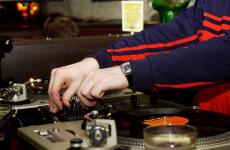DJs bring passion to the table
Sep 1, 2004
Scratching records, juggling beats and working the crowd are all key to being a successful disc jockey. But even more important is a turntable artist’s passion for his craft – sharing the music he loves and inviting audiences to hear new sounds.
“When you see someone smiling because of something you played, you get really excited,” said Brian Mertz, 25, a house music DJ who goes by DJ Mertz. “Those are great feelings that don’t come from other forms of interaction with people.”
Mertz disc jockeys as a hobby, with much of his time now spent studying for the GRE in Chicago. With degrees in journalism and law, he’s in pursuit of a Ph.D. so he can teach undergraduates. Playing gigs gives him a break from the books.
“I don’t think I would’ve been able to be serious without this release for creativity,” he said. “I have no illusions of grandeur. To make DJing a lifestyle, you have to have a lucky break.”
DJ Asiatic, or Alan Smith, 28, spends time in a suit and in a booth, balancing the DJ lifestyle at night at a managing position at Bachrachs, a men’s clothing store at Marketplace Mall, during the day. Smith plans to branch out into the competitive Chicago market through Tsunami Entertainment, an organization of DJs, promoters and dancers with a focus on the Asian-American scene.
Get The Daily Illini in your inbox!
“We’ve done a few things in Chicago, but not consistently,” he said. “The main focus here used to be on campus, now it’s on the downtown areas.”
Smith started DJing in 1986 while breakdancing on the side. After his brother’s suggestion for a stage name that represented his half-Japanese descent, he started marketing his name and himself as a hip hop, R&B;, reggae and house music DJ. Smith now has a regular spot at two clubs a week.
“When you spin something old and new together, and people wouldn’t believe those two went together, they get in awe and in a frenzy, jumping and screaming,” he said. “That’s when I get on the mic and tell them to put their hands up.”
Balancing a life outside of DJing is a talent of its own. Rick Shaddix, 29, or DJ Rickbats, works full time at Espresso Royale Cafe and works DJ gigs into his schedule. Shaddix plays at clubs, house parties and garages – from the “good to ghetto,” he said. He markets himself as a gothic music DJ – Halloween is his most in-demand season.
“Most of the campus is pretty focused on the types of people they cater to,” he said. “They’re not really people that would dig the stuff I would play. A lot of people stereotype goth or have the wrong idea about what it sounds like.”
Although Shaddix has made a name for himself in the Midwest, playing national gothic conventions with a gig next month in Scotland, he said DJing was still a job, with a lot of work, research and buying music.
“Unless you’re some star, it’s really no different than anyone else,” he said. “The really fun part for me is dressing up, seeing other people dressed up. That’s the only thing that sets me as a DJ apart from any other type of DJ.”
Adam Boskey, a 25-year-old Champaign native and Illini Media employee, has made DJing his life. He might be considered one of the busiest local DJs, playing gigs five nights a week. Boskey, or DJ Bozak as he’s known at the Boltini Lounge, Barfly and Nargile, to name a few, plays an eclectic mix of soulful hip hop, “old school” house, funk and R&B.;
“I followed suit with DJs that had the ability to rock any style,” he said. “That has made me stand out more … places know I can do different styles.”
The boom in venues for DJs to perform came hand in hand with a boom in the number of DJs, he said. Boskey took the competition in stride and made DJing his sole source of income.
“I can’t go out and buy a crazy car or anything like that, but I am making three-quarters of what my mom makes,” he said.
Boskey, who got his DJ name from a cross with his Hungarian heritage and a hip hop term for the male crotch, does have a complaint with the job – requests.
“I don’t mind them if the person is kind of gracious, respectful,” he said. “If I say ‘no’ and don’t have a certain song, you don’t have to tell me I’m a whack DJ and roll your eyes. People will come up and request like I’m their server.”
Plenty of DJs have problems with audience requests. Shaddix said many people don’t keep up with their music and request old songs DJs may not carry anymore. Mertz said he was not the kind of DJ that plays the big hits many want to hear.
“When you have a DJ who buys records, puts songs together, coming up and asking them about the latest hip hop thing, it’s gets on my nerves,” he said. “I want to challenge new people to the genre. If I bought this record, it’s because it makes me want to dance. I’m trying to find that similar reaction.”






